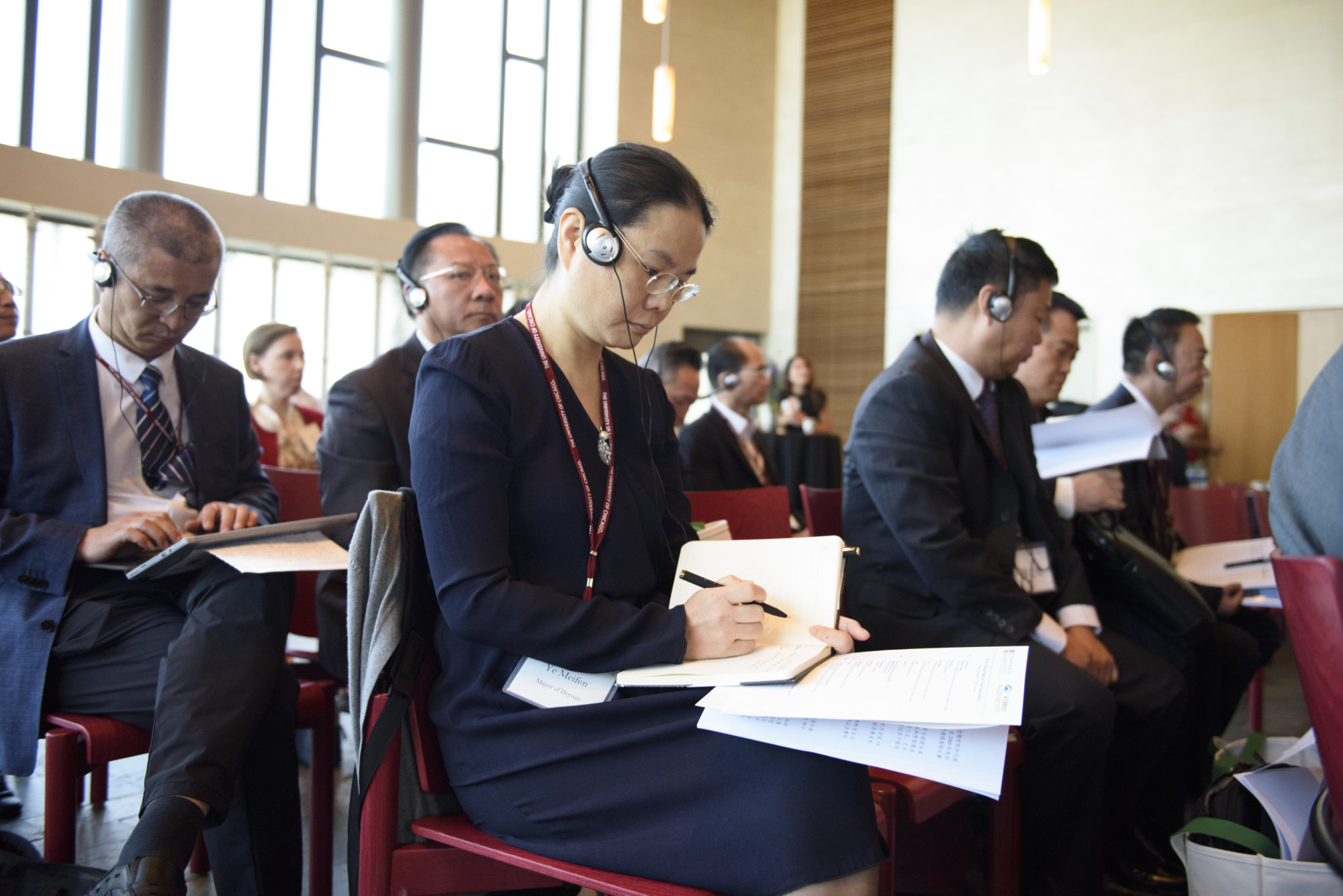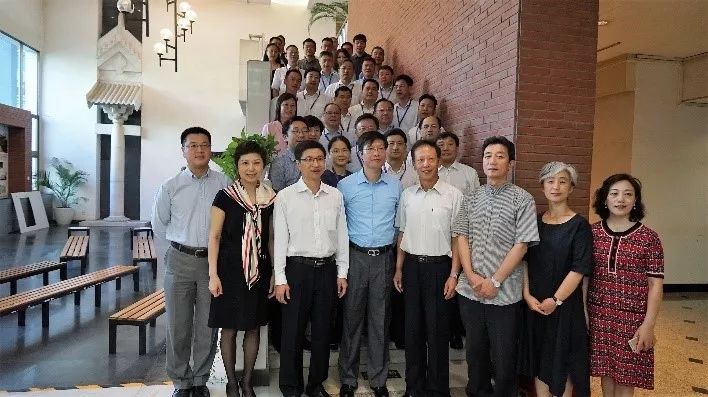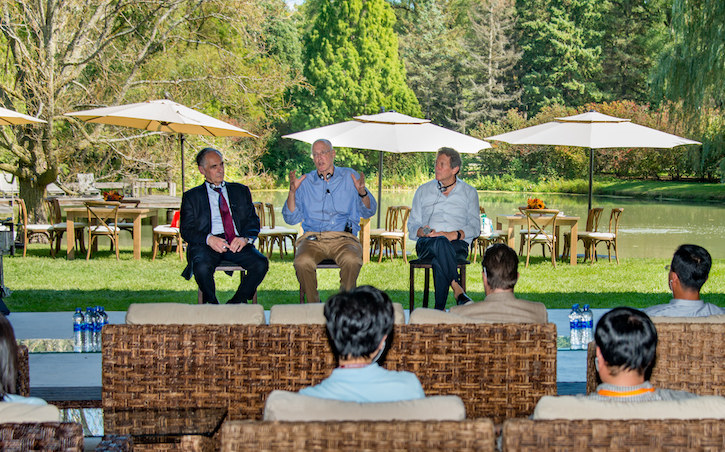
The Paulson Institute joined together with China Association of Mayors (CAM) in September to host the Mayors Training Program (MTP), welcoming a delegation of mayors and urban planning officials from China’s Guangdong province. Now in its fifth year, the program provides high-quality capacity building for China’s mayors and senior government officials in the field of sustainable urbanization. The program is made possible by generous support from Hyatt Hotels Corporation, Energy Foundation, and Qiaonyu Foundation, as well as the cooperation of academic partners including the Tsinghua University School of Architecture and the University of Chicago Graham School. To date, the program has provided training and exchange opportunities to around 100 mayors and government officials from Beijing, Guangdong, Zhejiang and Tianjin.
Tsinghua: Lectures on Sustainable Urbanization Development
The training program kicked off at the Tsinghua University campus in Beijing, with a week of classroom courses focusing on a variety of topics, including the sustainable urbanization, innovative urban governance, regional planning, and rural economic revitalization, among others. A diverse group of leading lecturers were invited to present to the program, including government officials from the National Development and Reform Commission, Ministry of Natural Resources, and Ministry of Agricultural and Rural Affairs, as well as scholars and experts from Chinese and American institutions, including Tsinghua University, Peking University, China Academy of Urban Planning & Design, China Center for International Economic Exchanges, and Paulson Institute.

New Orleans: A Comparative Study on City Resilience and Hurricane Emergency Preparation
The Guangdong delegation made its first stop in the U.S. in New Orleans, Louisiana, a southern coastal city. The Guangdong delegation members found similarities between the coastal environmental challenges facing New Orleans and their home cities, including erosion, extreme weather, wetlands loss, and potential sea-level rise due to climate change.
The experience of New Orleans with coastal resilience and hurricane response made those topics priorities for discussion throughout the various site visits. The delegation conducted in-depth discussions with research teams from the University of New Orleans and The Nature Conservancy, and visited the Port of New Orleans, the Homeland Security and Emergency Preparedness Office of New Orleans, the Urban Renewal Authority, and Greater New Orleans Inc. Key discussion topics included low-carbon city planning, green financing, international port sustainability, planning for coastal risk reduction and resilience, inter-departmental emergency preparation and recovery, residential development, commercial revitalization, and land stewardship, among others. By emphasizing the similar challenges facing Chinese and American cities, the Mayors Training Program offers unique learning opportunities and innovative solutions on urban planning that the delegates can take back to implement across their home province.
At the New Orleans City Hall, the delegation toured the New Orleans Office of Homeland Security and Emergency Preparedness (NOHSEP), where floor-to-ceiling screens allow Director Col. Terry Ebbert and his staff the ability to monitor weather conditions and local emergencies in real time. Empowered by big data from the Louisiana Wireless Information Network (LWIN), NOHSEP coordinates a series of responsive actions across each public works department, including fire, coastal, transportation, power, and police. In fact, according to NOHSEP, each dollar spent on planning and hazard mitigation ultimately saves six dollars in recovery costs.
The delegation was also deeply impressed by the conviction and resilience of the government and civil society of New Orleans in the aftermath of Hurricane Katrina. The Hyatt hotel where the delegation stayed had almost been destroyed by the hurricane. The Hyatt Hotel Group and its local General Manager Michael Smith spent over ten years working with the government and NGOs to raise financing for reconstructing the hotel and supporting the surrounding neighborhood. Now, not only has the hotel been rebuilt into a city landmark, but it has also helped drive the economic recovery of the surrounding communities.
Chicago: Inspiring Innovation in Sustainable Urbanization and Rural Revitalization
The last leg of the program brought the delegation to Chicago. The University of Chicago and Paulson Institute designed 12 thematic seminars and 12 on-site sessions to align with the key study areas the Guangdong delegation had identified. The study topics in the Chicago-based part of the curriculum focused on community development, smart cities, policy innovation driven by big data, public transport and water resources; and the involvement of business and communities in governance.
The Guangdong delegation heard many perspectives and project analyses from an array of local organizations and partners: Chicago’s Office of Sustainable Development; the Chicago Council on Global Affairs; Chicago Metropolitan Agency for Planning; Urban Center for Computation and Data; Community Action of Chicago; Energy Foundation; the University of Chicago; Argonne National Laboratory; IU Laboratory; SOM; NORR; Chicago Trust Fund; International Port of Illinois; Hyatt Hotel Group; Wanxiang America; McCook Reservoir; Polsky Innovation Center at the University of Chicago; and the 1871 Incubator.
The US-China Mayors Panel, chaired by Paulson Institute chairman Hank Paulson, was a highlight in the delegation’s Chicago program. American representatives on the panel had in-depth exchanges with their Chinese counterparts from Guangdong. The core message conveyed by the panelists—three former US mayors from Chicago, Philadelphia and Miami—was that economic considerations should be included in each city’s plan for sustainable development. Mayors from Guangdong province shared that most cities in China are facing the same development challenges as American cities.

Paulson Institute chairman Hank Paulson, Hyatt executive chairman Thomas J. Pritzker, and University of Chicago president Robert Zimmer led a dialogue with the Guangdong delegation at the Pritzker farm in the Chicago suburbs. At the farm the group joined the Guangdong delegation to conduct in-depth exchanges on issues including urban resilience, ecological and sustainable urbanization, and urban management innovation driven by big data. Delegation members, including the mayor of Guangdong’s Maoming city, shared findings and insights from the first week of the program and extended their desire for future cooperation.
Closing Achievements
At the program’s graduation ceremony, Christopher Guymon, Dean of University of Chicago Graham School, delivered a sincere message to Guangdong delegation: “We want you to know that you are a part of the University of Chicago. You have a serious set of challenges ahead of you, but we believe that with experiences like these, through the opportunity of collaborating together, you will find solutions to these challenges. Together, we will make stronger cities, and not only your province, but your country, and the world, a better place.”
Li Jing, leader of the delegation, and Director-General of the Guangdong Provincial Transportation Department, addressed the graduation ceremony on behalf of his fellow participants: “The Mayors Training Program offered us a valuable learning and exchange experience. What we’ve learned has enriched our lives and broadened our minds. Through lectures, seminars, and site visits, we have further opened our eyes, provoked thought and deepened our understanding of the current affairs, our national conditions, and our province. We have deepened our insights into the advanced ideas and practices of the “comprehensive sustainable development” from the developed countries and regions. Now we have a clearer mind about how to strengthen the exchanges and learn from each other to make up for the shortcomings in the local and industrial development of Guangdong, in a way that our own characteristics can be maintained while being integrated into the whole picture of development.”



